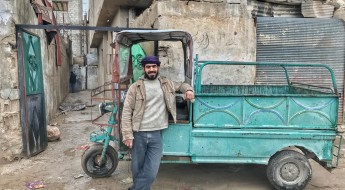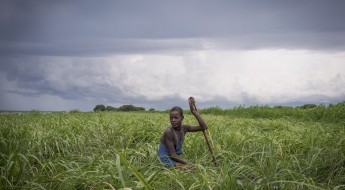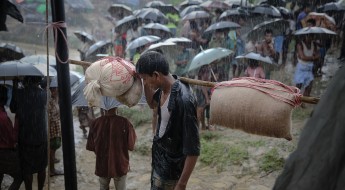In photos: Escape from Syria's Eastern Ghouta
 On the grounds of a destroyed electricity plant it feels as though a cloak of human suffering is wrapping around you. This place is in tatters, just like the lives of its new inhabitants. It is one of a number of temporary shelters now housing thousands of Syrians who fled Eastern Ghouta after years of violence.CC BY-NC-ND / ICRC / Matthew Morris
On the grounds of a destroyed electricity plant it feels as though a cloak of human suffering is wrapping around you. This place is in tatters, just like the lives of its new inhabitants. It is one of a number of temporary shelters now housing thousands of Syrians who fled Eastern Ghouta after years of violence.CC BY-NC-ND / ICRC / Matthew Morris Um Mohammed is among those who fled. She has experienced seven long years of pain. She said, “I have suffered a lot, especially after my husband’s death. Everything was very expensive, beyond belief. I could go on for hours describing the tragedy that we were living there.” Um Mohammed cares for ten children: eight of her own and now two little orphan girls as well. These children would be lost, lonely and afraid somewhere in Syria if it wasn’t for this woman’s selfless act.
Um Mohammed is among those who fled. She has experienced seven long years of pain. She said, “I have suffered a lot, especially after my husband’s death. Everything was very expensive, beyond belief. I could go on for hours describing the tragedy that we were living there.” Um Mohammed cares for ten children: eight of her own and now two little orphan girls as well. These children would be lost, lonely and afraid somewhere in Syria if it wasn’t for this woman’s selfless act. All of them live here in a small, temporary, newly-constructed wooden room – one of the dozens being built side-by-side on the cold, hard floors of the power plant’s main building. The rooms, built by organizations like the ICRC and the Syrian Arab Red Crescent, seek to make life a little more bearable. Each one is perhaps the size of a small double bedroom in Paris, London, Beirut or New York.CC BY-NC-ND / ICRC / Matthew Morris
All of them live here in a small, temporary, newly-constructed wooden room – one of the dozens being built side-by-side on the cold, hard floors of the power plant’s main building. The rooms, built by organizations like the ICRC and the Syrian Arab Red Crescent, seek to make life a little more bearable. Each one is perhaps the size of a small double bedroom in Paris, London, Beirut or New York.CC BY-NC-ND / ICRC / Matthew Morris For many, the journey to these shelters was arduous, full of fear, but also hope. Hope that safety was round the corner at last. Many came here with nothing except the clothes they were wearing and the worn-out shoes on their feet, while some had no shoes at all.CC BY-NC-ND / ICRC / Matthew Morris
For many, the journey to these shelters was arduous, full of fear, but also hope. Hope that safety was round the corner at last. Many came here with nothing except the clothes they were wearing and the worn-out shoes on their feet, while some had no shoes at all.CC BY-NC-ND / ICRC / Matthew Morris You can taste the dust and smell the cigarette smoke that hangs in the air. You can hear babies crying. Men touch you on the arm, imploring you to go with them to help with something, somewhere. And you can see the utter desperation when you look into people’s eyes. Everywhere you turn, there is an onslaught on the senses in and around these shelters of Rural Damascus.
You can taste the dust and smell the cigarette smoke that hangs in the air. You can hear babies crying. Men touch you on the arm, imploring you to go with them to help with something, somewhere. And you can see the utter desperation when you look into people’s eyes. Everywhere you turn, there is an onslaught on the senses in and around these shelters of Rural Damascus. During the day, we visit four shelters and meet countless people with stories to tell: the English teacher from Douma who survived intense violence, but knew there was little medication and few doctors available if it ever came to it.
During the day, we visit four shelters and meet countless people with stories to tell: the English teacher from Douma who survived intense violence, but knew there was little medication and few doctors available if it ever came to it. The man who on good days ate a little bread with barley, washed down with dirty boiled water. But who on bad days had to eat crushed animal feed that is normally fed to cows.
The man who on good days ate a little bread with barley, washed down with dirty boiled water. But who on bad days had to eat crushed animal feed that is normally fed to cows. And the children for whom school is a distant memory. Maths, history, science, long ago replaced by the painful lessons learned in war: run, hide, grieve, survive.CC BY-NC-ND / ICRC / Matthew Morris
And the children for whom school is a distant memory. Maths, history, science, long ago replaced by the painful lessons learned in war: run, hide, grieve, survive.CC BY-NC-ND / ICRC / Matthew Morris Throughout Syria, millions of people remain affected by the conflict. Hundreds of thousands have been killed or injured. Half of all Syrians are displaced, either inside the country or abroad. Families have been separated. Those forced to flee search in desperation for safe places where they can go.CC BY-NC-ND / ICRC / Matthew Morris
Throughout Syria, millions of people remain affected by the conflict. Hundreds of thousands have been killed or injured. Half of all Syrians are displaced, either inside the country or abroad. Families have been separated. Those forced to flee search in desperation for safe places where they can go.CC BY-NC-ND / ICRC / Matthew Morris Civilians and the services they need in order to survive are being attacked. Medics and hospitals are targeted. These things must never happen. We say so time and time again and we will continue to do so. Our messages must not be ignored by those taking part in this conflict and their backers across the world.CC BY-NC-ND / ICRC / Matthew Morris
Civilians and the services they need in order to survive are being attacked. Medics and hospitals are targeted. These things must never happen. We say so time and time again and we will continue to do so. Our messages must not be ignored by those taking part in this conflict and their backers across the world.CC BY-NC-ND / ICRC / Matthew Morris This may make for uncomfortable reading. But please, take a moment to think of all these people in this photo gallery and the millions of Syrians facing yet another year of tremendous hardship. Imagine going to bed without food in your stomach in a dusty warehouse, on a noisy, communal factory floor, or on a disused football pitch surrounded by strangers in a place that should never be called ‘home’.CC BY-NC-ND / ICRC / Matthew Morris
This may make for uncomfortable reading. But please, take a moment to think of all these people in this photo gallery and the millions of Syrians facing yet another year of tremendous hardship. Imagine going to bed without food in your stomach in a dusty warehouse, on a noisy, communal factory floor, or on a disused football pitch surrounded by strangers in a place that should never be called ‘home’.CC BY-NC-ND / ICRC / Matthew Morris When you have something to eat tonight, please think of them. When you say goodnight to your children, please think of them. And when you wake up tomorrow because no one has destroyed the building you just slept in, please think of them again.
When you have something to eat tonight, please think of them. When you say goodnight to your children, please think of them. And when you wake up tomorrow because no one has destroyed the building you just slept in, please think of them again. Syrians will need our help for years to come. What they so desperately need right now is a lasting political solution which takes them on the road to peace.CC BY-NC-ND / ICRC / Matthew Morris
Syrians will need our help for years to come. What they so desperately need right now is a lasting political solution which takes them on the road to peace.CC BY-NC-ND / ICRC / Matthew Morris
Thousands of Syrians have fled Eastern Ghouta, north-east of Damascus, after years of violence.
Many are now living in temporary shelters nearby.
These are some of their stories.




